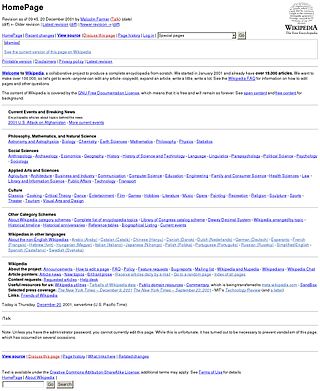
Wikipedia, a free-content online encyclopedia written and maintained by a community of volunteers known as Wikipedians, began with its first edit on 15 January 2001, two days after the domain was registered. It grew out of Nupedia, a more structured free encyclopedia, as a way to allow easier and faster drafting of articles and translations.

The English Wikipedia is the primary English-language edition of Wikipedia, an online encyclopedia. It was created by Jimmy Wales and Larry Sanger on January 15, 2001, as Wikipedia's first edition.

GNE was a project to create a free-content online encyclopedia, licensed under the GNU Free Documentation License, under the auspices of the Free Software Foundation. The project was proposed by Richard Stallman in December 2000 and officially started in January 2001. It was moderated by Héctor Facundo Arena, an Argentine programmer and GNU activist.

Wikinews is a free-content news wiki and a project of the Wikimedia Foundation that works through collaborative journalism. Wikipedia co-founder Jimmy Wales has distinguished Wikinews from Wikipedia by saying, "On Wikinews, each story is to be written as a news story as opposed to an encyclopedia article." Wikinews's neutral point of view policy aims to distinguish it from other citizen journalism efforts such as Indymedia and OhmyNews. In contrast to most Wikimedia Foundation projects, Wikinews allows original work in the form of original reporting and interviews. In contrast to newspapers, Wikinews does not permit op-ed.

The free online encyclopedia Wikipedia has been criticized since its creation in 2001. Most of the criticism has been directed toward its content, community of established users, process, and rules. Critics have questioned its factual reliability, the readability and organization of its articles, the lack of methodical fact-checking, and its political bias. Concerns have also been raised about systemic bias along gender, racial, political, corporate, institutional, and national lines. Conflicts of interest arising from corporate campaigns to influence content have also been highlighted. Further concerns include the vandalism and partisanship facilitated by anonymous editing, clique behavior, social stratification between a guardian class and newer users, excessive rule-making, edit warring, and uneven policy application.
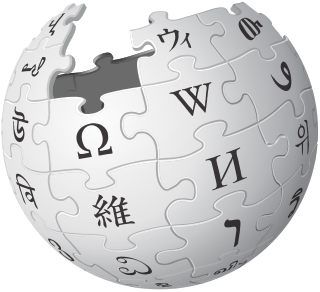
Wikipedia is a free-content online encyclopedia written and maintained by a community of volunteers, known as Wikipedians, through open collaboration and the use of the wiki-based editing system MediaWiki. Wikipedia is the largest and most-read reference work in history. It is consistently ranked as one of the ten most popular websites in the world, and as of 2024 is ranked the fifth most visited website on the Internet by Semrush. Founded by Jimmy Wales and Larry Sanger on January 15, 2001, Wikipedia is hosted by the Wikimedia Foundation, an American nonprofit organization that employs a staff of over 700 people.

Knol was a Google project that aimed to include user-written articles on a range of topics. The lower-case term knol, which Google defined as a "unit of knowledge", referred to an article in the project. Knol was often viewed as a rival to Wikipedia.
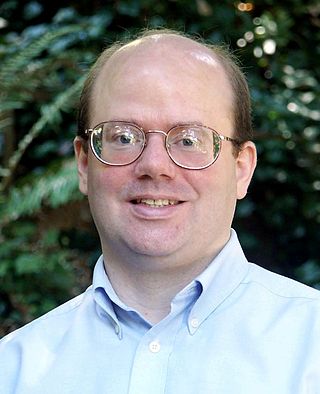
Lawrence Mark Sanger is an American Internet project developer and philosopher who was the editor-in-chief of the online encyclopedia Nupedia and co-founded its successor Wikipedia along with Jimmy Wales. Sanger coined the name 'Wikipedia', and wrote many of Wikipedia's early guidelines, including the "Neutral point of view" and "Ignore all rules" policies. Sanger later worked on other encyclopedic projects, including Encyclopedia of Earth, Citizendium, and Everipedia, and advised the nonprofit American political encyclopedia Ballotpedia.
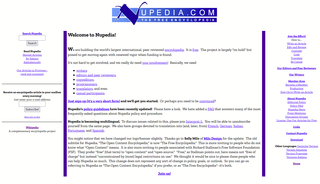
Nupedia was an English-language online encyclopedia whose articles were written by volunteer contributors with appropriate subject matter expertise, reviewed by expert editors before publication, and licensed as free content. It was founded by Jimmy Wales and underwritten by Bomis, with Larry Sanger as editor-in-chief. Nupedia operated from October 1999 until September 2003. It is best known today as the predecessor of Wikipedia. Nupedia had a seven-step approval process to control content of articles before being posted, rather than live wiki-based updating. Nupedia was designed by a committee of experts who predefined the rules. It had only 21 articles in its first year, compared with Wikipedia having 200 articles in the first month, and 18,000 in the first year.

The Wikipedia community, collectively and individually known as Wikipedians, is an online community of volunteers who create and maintain Wikipedia, an online encyclopedia. Since August 2012, the word "Wikipedian" has been an Oxford Dictionary entry.
This is a list of books about Wikipedia or for which Wikipedia is a major subject.
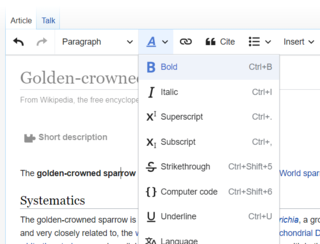
VisualEditor (VE) is an online rich-text editor for MediaWiki-powered wikis that provides a direct visual way to edit pages based on the "what you see is what you get" principle. It was developed by the Wikimedia Foundation in partnership with Fandom. In July 2013, it was enabled by default on several of the largest Wikipedia projects.

Gender bias on Wikipedia is a term used to describe various sex-related facts about Wikipedia: its volunteer contributors are mostly male, although almost 400,000 encyclopedic biographies about women exist on Wikipedia men have many more, and topics primarily of interest to women are less well-covered.

Aaron Halfaker is a principal applied scientist at Microsoft Research. He previously served as a research scientist at the Wikimedia Foundation until 2020.
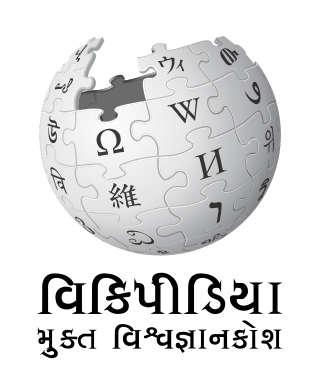
Gujarati Wikipedia is the Gujarati language version of Wikipedia, an online encyclopedia. It was founded in July, 2004. It has 30,368 articles. As of March 2024, it generates 3 million monthly views.
Artificial intelligence is used in Wikipedia and other Wikimedia projects for the purpose of developing those projects. Human and bot interaction in Wikimedia projects is routine and iterative.
In Wikipedia and similar wikis, an edit count is a record of the number of edits performed by a particular editor, or by all editors on a particular page. An edit, in this context, is an individually recorded change to the content of a page. Within Wikimedia projects, a number of tools exist to determine and compare edit counts, resulting in their usage for various purposes, with both positive and negative effects.

Wikipedia @ 20 is a book of essays about Wikipedia published by the MIT Press in late 2020, marking 20 years since the creation of Wikipedia. It was edited by academic and author Joseph M. Reagle Jr. and social researcher Jackie Koerner. Contributions came from 34 other Wikipedians, Wikimedians, academics, researchers, journalists, librarians, artists and others, reflecting on particular histories and future themes in Wikipedia discussions.

Jason Moore is an American Wikipedia editor among the English Wikipedia's most active contributors by edit count. Editing since 2007 as "Another Believer", he has specialized in current events, with coverage including the COVID-19 pandemic, George Floyd protests, and the culture of Portland, Oregon, where he is based. On Wikipedia, Moore has created and developed editor affinity groups for joint work on these topics. As an organizer in the Wikimedia movement, Moore has hosted meet-ups and edit-a-thons to train new editors.














